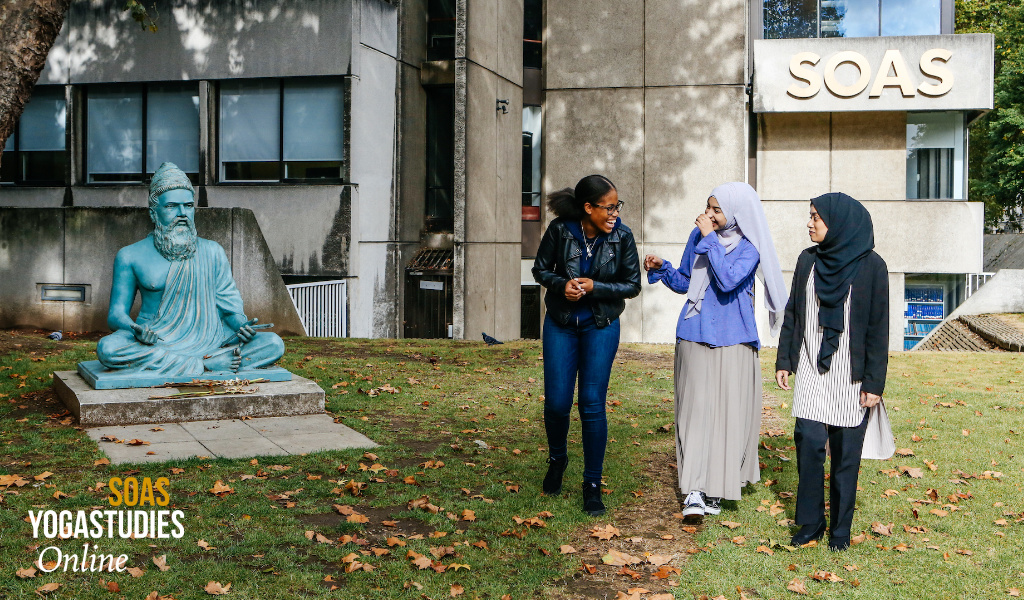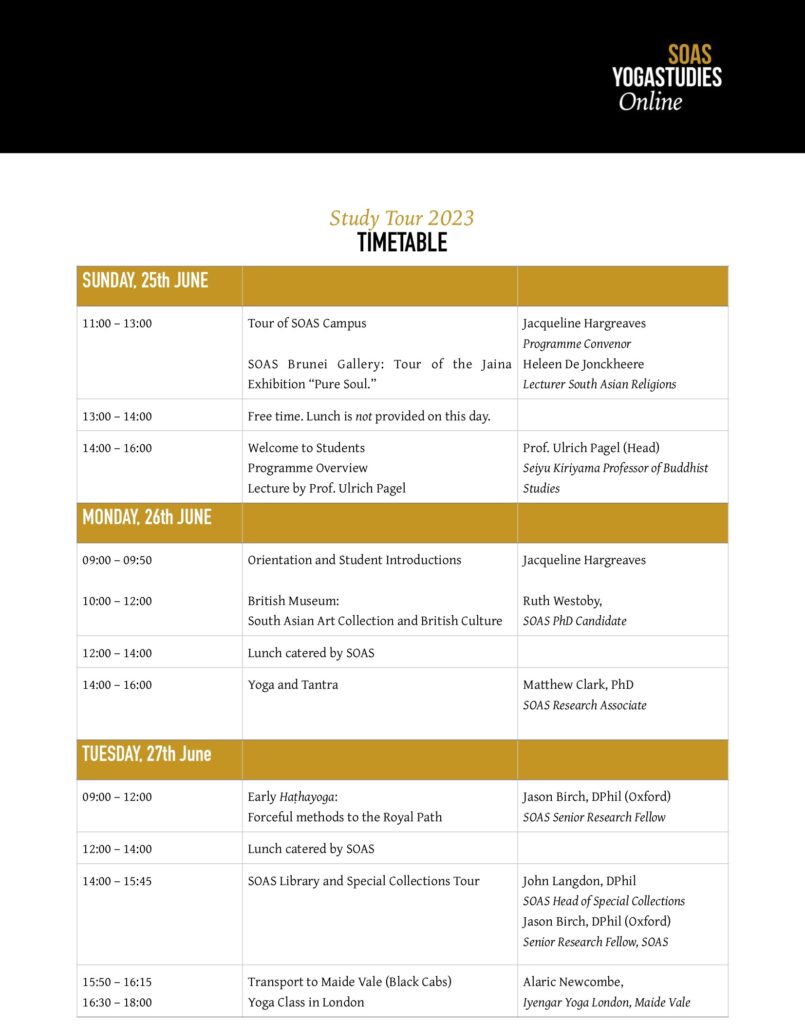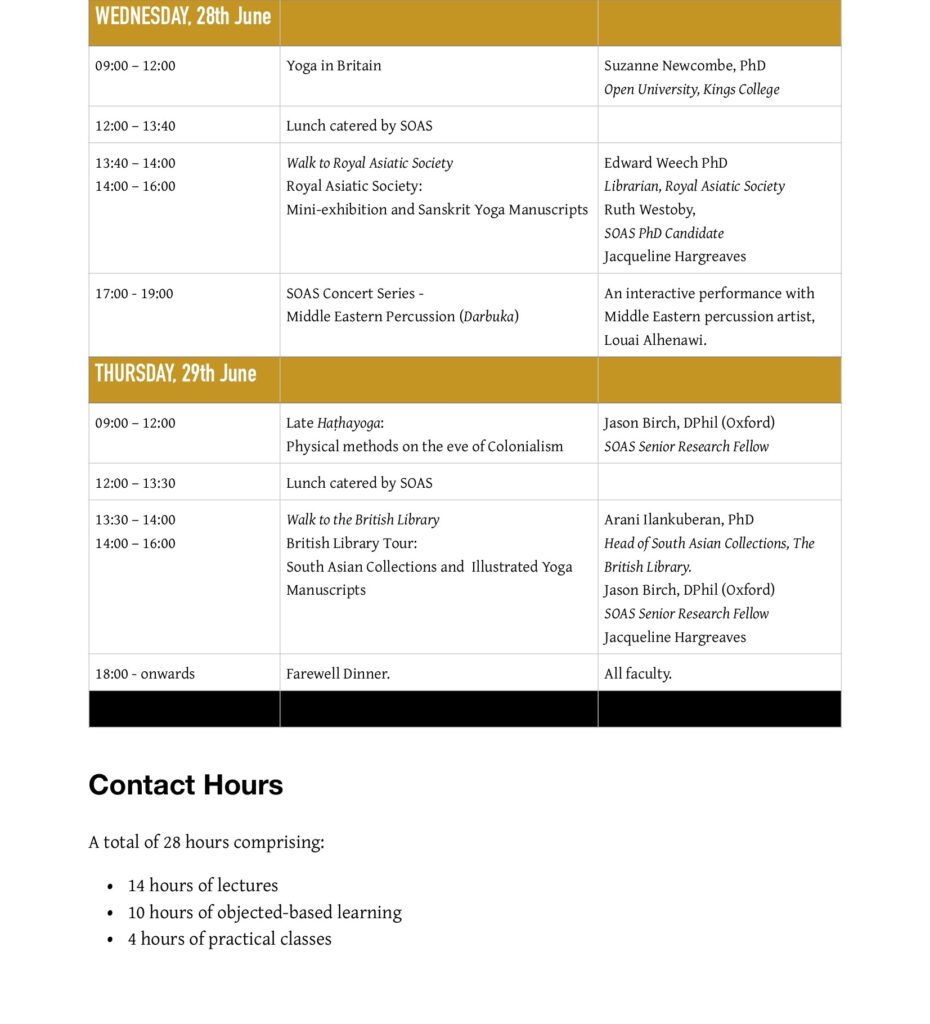SOAS Centre of Yoga Studies was honoured to host the online recording of the Haṭhapradīpikā Symposium – Launch of the New Digital Edition that took place at the University of Oxford, Bodleian Weston Library on the 23rd February 2024.
This symposium showcases the collaborative outputs of the Light on Hatha Yoga Project, which was funded by the Arts and Humanities Research Council (AHRC) and the German Research Foundation Deutsche Forschungsgemeinschaft (DFG) from January 2021 to January 2024.
This three-year research project brought together arts and humanities researchers in the UK and Germany to conduct outstanding joint research. The project has produced a digital critical edition and English translation of the Haṭhapradīpikā, authored by Svātmārāma in the early 15th century, which is arguably one of the most widely cited and influential texts on physical yoga, and is instrumental for the flourishing of haṭhayoga on the eve of colonialism.
Building on the success of the five-year ERC-funded Hatha Yoga Project at SOAS University of London, scholars Prof. James Mallinson and Dr Jason Birch of the University of Oxford have collaborated with Prof. Dr Jürgen Hanneder, Dr Mitsuyo Demoto, and Nils Jacob Liersch, PhD Candidate of Philipps-Universität Marburg to produce this critical edition and English translation based on over 200 manuscripts, written in a variety of Indic scripts. The oldest manuscript sourced for the project is dated 1496 CE, which is remarkably close to the date of authorship by Svātmārāma himself.
Beyond the principal investigators and senior researchers, this project has been supported by research assistants at the École française d’Extrême-Orient (EFEO) in Pondicherry, India.
Prof. James Mallinson, University of Oxford (00:00)
Welcome
The Composition of Svātmārāma’s Haṭhapradīpikā.
Nils-Jacob Liersch, MA PhD Candidate, Philipps-Universität Marburg (34:19)
Computer Stemmatics applied to the Haṭhapradīpikā.
Dr Mitsuyo Demoto, Philipps-Universität Marburg (01:04:11)
Development of the various recensions of the Haṭhapradīpikā.
Dr Jason Birch, University of Oxford (01:39:18)
Insights from the New Critical Edition of the Haṭhapradīpikā.
Prof. Jürgen Hanneder, Philipps-Universität Marburg (02:19:19)
Brahmānanda’s Commentary on the Haṭhapradīpikā.
Launch of the New Digital Edition. (02:54:17)
Hathapradipika.online (2024, Language: Sanskrit, English).





To cancel your attendance, please contact us: cys@soas.ac.uk


SOAS Centre of Yoga Studies was honoured to host Dominik A. Haas of the Austrian Academy of Sciences and the University of Vienna, who is author of Gāyatrī: Mantra and Mother of the Vedas (2023). Prof. Ulrich Pagel, Chair of the CYS, hosted the event along with Jacqueline Hargreaves, CYS Programme Manager. This is a recording of the lecture, which took place via an online webinar on Monday, 18th December, 2023.
The mantra known as Gāyatrī or Sāvitrī (Ṛgveda III 62.10) is one of the most frequently recited texts of mankind. Over the course of time it has not only been personified as the mother of the Vedas – the oldest religious literature of South Asia –, but has even come to be venerated as a goddess. It plays an important role in contemporary Hinduism as well as in modern yoga and alternative spiritual currents around the globe. Many consider it the most important, most efficacious, or holiest mantra of all. In this lecture, Dr Haas will present the results of his recently completed book project on the Gāyatrī-Mantra. He will talk about its history between the Vedic Age and modern yoga, focussing on the period between 1000 BCE and 1000 CE, the period in which the mantra rose to become a shibboleth of Brahmanical Hinduism and its deified form was fleshed out.
Dominik A. Haas completed his doctorate in South Asian Studies at the University of Vienna in 2022 with a dissertation on the Gāyatrī mantra. His publications and lectures deal with Hinduism, the Vedic religion, mantras, deification and yoga. Following an interdisciplinary approach, he combines philological and historical research with methods and perspectives from a wide range of disciplines, including text linguistics and religious studies. As a co-founder of the Initiative for Fair Open Access Publishing in South Asian Studies (FOASAS), Haas also advocates for modern forms of scholarly communication and fair working conditions in the academic and publishing sectors. He is currently a Post-Doc fellow and has published a monograph based on his dissertation with the Austrian Academy of Sciences in Contributions to the Cultural and Intellectual History of Asia. In Gāyatrī: Mantra and Mother of the Vedas, Haas reconstructs for the first time the history of the Gāyatrī mantra, which, as the most important initiatory mantra of Brahmanical Hinduism, has played a central role in the formation of social and religious identity for over 2,000 years. Over time, the mantra was not only personified as the mother of the Vedas, the oldest religious literature in South Asia, but was even worshiped as a goddess. In addition to working on his book, Haas is also preparing a new research project that will examine the cultural history of mantras and their recitation. He also leads courses on the topics of mantras and religious history at the University of Vienna.
Gāyatrī: Mantra and Mother of the Vedas is available open access by: Open Access Fonds der Österreichischen Akademie der Wissenschaften. (Pages: 359 pages, Format: 29,7x21cm, Language: English.)

The Study Tour 2023 will provide an extraordinary opportunity for students to meet the faculty of the School and participate in lectures as well as curated object-oriented learning with the foremost scholars of Yoga Studies.
– Jacqueline Hargreaves
SOAS University of London is pleased to announce a Study Tour 2023 exclusively for the students of the 270-hour Yoga and Meditation Education Certificate. The Study Tour 2023 will take place in London at the prestigious campus of SOAS University, which is centred in the heart of Bloomsbury. Students will experience first-hand our facilities and experience the vibrant and unique atmosphere that makes SOAS so special. The campus is located within walking distance of other important educational landmarks such as the British Museum, the British Library, and the Wellcome Institute.
The Study Tour 2023 will provide an extraordinary opportunity for students to meet the faculty of the School and participate in lectures with the foremost scholars of Yoga Studies. We will learn about current research projects, including the methods and outputs, which are continuing to shape our knowledge of the history and practice of Yoga.
We will visit the world’s most important academic library for the study of Asia, Africa, and the Middle East and the Brunei Gallery, which exhibits SOAS’s incredible permanent collection of artworks and objects. We have a formal association with the British Museum, the British Library, and the Royal Asiatic Society, which allows us to offer exceptional access to the collections and curatorial expertise of these institutions. As such, we will engage with object-based study via lectures and contributions from a wide range of leading scholars and curators.
In addition, we will enjoy the talents of the broader SOAS community by listening to a music concert by the School’s music department, participating in a Yoga classes in the vibrant London yoga scene, and enjoy extracurricular activities with the inaugural cohort of students of the Yoga and Meditation Education Certificate.
To begin, on Sunday 25th June, we invite you to meet us at the front stairs of the SOAS Brunei Gallery for a tour of the Jaina Exhibition “Pure Soul”.
The learning outcomes anticipated for this course are:


SOAS University of London, Thornhaugh Street, Russell Sq, London WC1B 5DQ, United Kingdom
On Sunday 25th June at 11:00am sharp, we invite you to meet us for orientation at the front stairs of the SOAS Brunei Gallery.
Unless otherwise stated, all of the lectures will be held in:
Room B102, Brunei Gallery
SOAS University of London.

We will look at the key figures who are influential in modern mindfulness, reflect upon the controversies, and critique the public discourse –– such as public policy, social values, and social vision –– that surrounds modern mindfulness.
– Tessa Watt
This PodCourse entitled Mindfulness in the Modern World is taught by Tessa Watt, PhD at SOAS University of London.
In this course we will look at the rise of the modern mindfulness movement from its roots in Buddhist traditions to its role in 21st century public discourse.
This PodCourse focuses specifically on Mindfulness in the Modern World and is divided into three modules:
Module 1: The Roots of Modern Mindfulness.
In the first module, we will consider: definitions of modern mindfulness, the difference between mindfulness and meditation, the roots of mindfulness practice in Buddhism, and the key figures and practices of modern mindfulness in therapeutic and clinical settings.
Module 2: Controversies in Modern Mindfulness.
In the second module, we will examine some of the critiques and criticisms that modern mindfulness has encountered during its rise in popularity. We will consider scholarly debates about its definition, whether it is a religion by stealth, the potential dangers and ethical challenges, and its role as a tool for/against capitalism and activism.
Module 3: Mindfulness in Public Discourse.
In the third module, we will consider the suggestion that mindfulness is ‘an essential skill’ that can help with the pressing challenges of our age. We will attempt to answer the important question ‘what is mindfulness for? ‘ to determine whether it assists or impedes social resilience and innovation.
The learning outcomes anticipated for this PodCourse are: